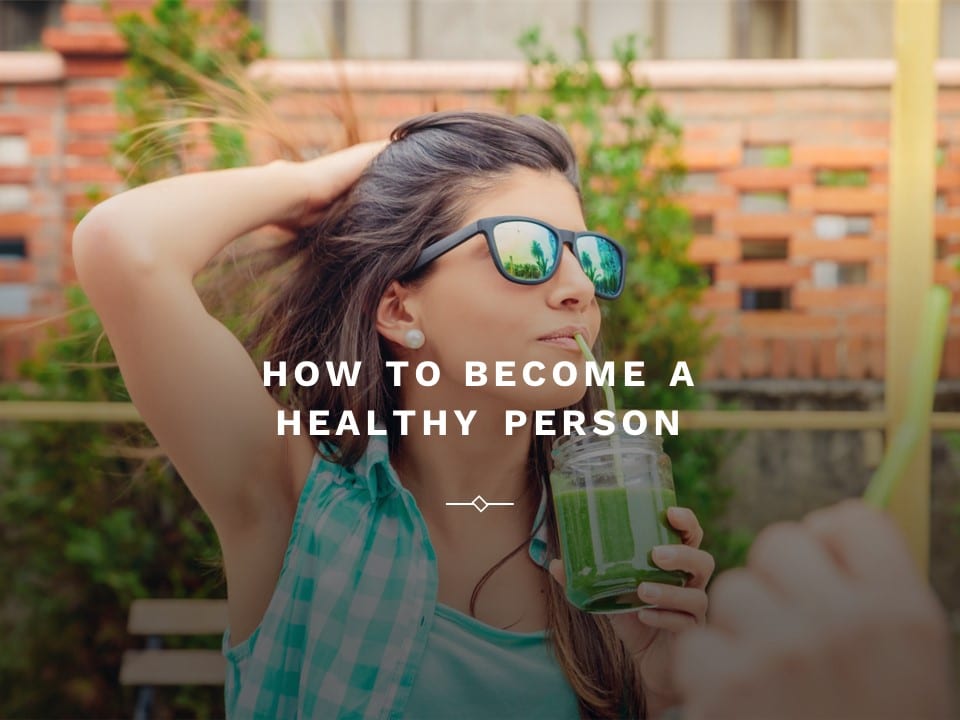How to Become a Healthy Person – The Ultimate Guide
Living a healthy lifestyle is essential for our physical and mental well-being.
However, with busy schedules and endless distractions, it can be challenging to prioritize our health.
The good news is that small changes in our diet, exercise, and lifestyle can significantly benefit our overall health and happiness.
This article will provide you with tips and strategies to become a healthier person, inside and out.
We’ll cover everything from developing healthy eating habits to finding enjoyable exercise routines and stress-reducing practices.
We’ll also explore the importance of mental health and the various ways you can take care of your emotional and psychological well-being.
Whether you’re just starting your health journey or looking for new ways to improve your current habits, this article will provide practical advice and inspiration.
By implementing these tips, you can experience the transformative effects of a healthy lifestyle, including increased energy, better mood, and a stronger immune system.
So, let’s dive in and discover how to become a healthy person through diet, exercise, and lifestyle tips!
What is a Healthy Person?
A healthy person is not simply someone who avoids illness but rather an individual who thrives physically, mentally, and emotionally. True health encompasses a broad spectrum of well-being indicators, including blood biomarkers, physical function, mental resilience, and the ability to engage in life with energy and purpose.
Biological Health Markers
Health can often be measured through objective markers found in routine blood tests and medical assessments. Some key indicators include:
- Optimal Blood Sugar Levels – Fasting blood glucose and A1C levels within a healthy range indicate stable energy levels and metabolic function.
- Cholesterol & Heart Health – Healthy HDL, LDL, and triglyceride levels support cardiovascular health.
- Inflammation Levels – Low levels of C-reactive protein (CRP) and other inflammatory markers suggest a well-regulated immune system.
- Nutrient Levels – Adequate vitamin D, B vitamins, magnesium, and iron levels are essential for energy production and overall cellular health.
- Hormonal Balance – Proper levels of key hormones like cortisol, testosterone, estrogen, and thyroid hormones contribute to metabolic and emotional stability.
Physical Function & Mobility
Being physically healthy means more than just looking fit—it’s about being able to move well, maintain strength, and perform daily activities with ease. Signs of good physical health include:
- Strong Cardiovascular Fitness – The ability to walk, jog, or climb stairs without excessive fatigue.
- Muscle Strength & Endurance – Functional strength to lift objects, carry groceries, or play with children.
- Joint Mobility & Flexibility – A full range of motion in major joints, reducing the risk of injury and chronic pain.
- Adequate Recovery & Energy Levels – Feeling refreshed after a night’s sleep and able to perform tasks throughout the day without exhaustion.
Mental & Emotional Well-being
Mental and emotional health is just as crucial as physical well-being. A truly healthy person can manage stress, find joy in daily activities, and maintain fulfilling relationships. Key indicators include:
- Emotional Stability – The ability to handle stress, adapt to challenges, and maintain a balanced mood.
- Cognitive Function – Good memory, focus, and problem-solving skills are signs of a well-functioning brain.
- Social Connection – Strong relationships and a sense of belonging contribute to long-term happiness and mental resilience.
- Life Satisfaction & Purpose – Feeling a sense of meaning and fulfillment in one’s daily activities.
Lifestyle & Daily Habits
Health is largely influenced by daily habits, which shape long-term outcomes. A healthy person consistently engages in behaviors that support well-being, such as:
- Balanced Nutrition – Eating a diet rich in whole foods, adequate protein, and essential micronutrients.
- Regular Physical Activity – Engaging in strength training, cardiovascular exercise, and flexibility work.
- Restorative Sleep – Getting 7-9 hours of quality sleep each night to support recovery and cognitive function.
- Mindfulness & Stress Management – Practices like meditation, prayer, journaling, or gratitude exercises to maintain mental clarity.
- Avoidance of Harmful Substances – Limiting alcohol, avoiding smoking, and minimizing processed food consumption.
A healthy person is someone who finds balance across all these aspects, ensuring their body, mind, and spirit work harmoniously. By consistently monitoring key health indicators and making proactive lifestyle choices, anyone can cultivate long-term well-being.
How to Become a Healthier Person
Becoming a healthier person isn’t about achieving perfection—it’s about making consistent, intentional choices that improve your well-being over time.
True health is built on sustainable habits, not quick fixes or extreme measures. Whether you’re starting from scratch or looking to fine-tune your current routine, small, strategic changes in your diet, exercise, mindset, and daily lifestyle can lead to significant long-term benefits.
This step-by-step guide breaks down the key actions you can take to improve your physical health, mental resilience, and overall quality of life.
By focusing on practical and achievable steps, you can create a foundation for lasting health and vitality.
Step 1: Set a SMART Goal
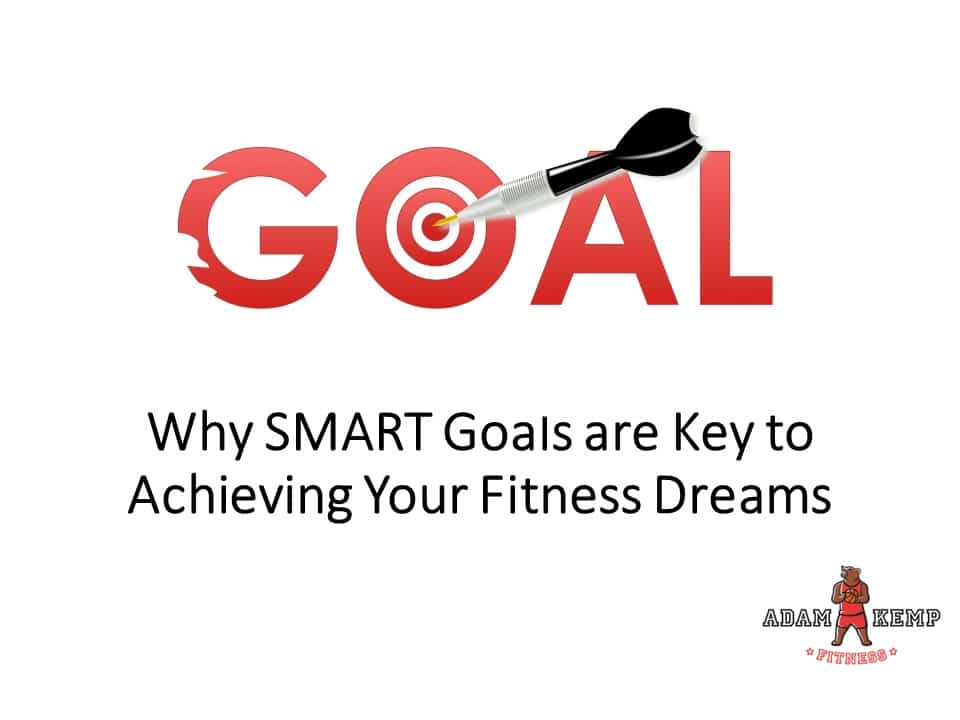
If you want to improve your health, the first step is to set a SMART goal.
SMART stands for:
- Specific
- Measurable
- Achievable
- Relevant
- Time-bound
Setting a SMART goal is crucial for people who want to make changes to help them become healthy because it can help you clarify what you want and how you plan to achieve it.
For instance, if you want to lose weight, set a specific goal, such as losing 2 pounds per week for 8-weeks straight.
Or, if you want to improve your mental health, you could set a goal to practice mindfulness for 10 minutes daily for one month.
Setting a SMART goal helps you break down your larger goal into smaller, more manageable steps.
It gives you a roadmap to follow and helps you stay motivated as you work towards becoming a healthy person.
By setting a SMART goal, you can become more accountable for your health and take the necessary steps to achieve a healthier lifestyle.
Step 2: Fix Your Diet
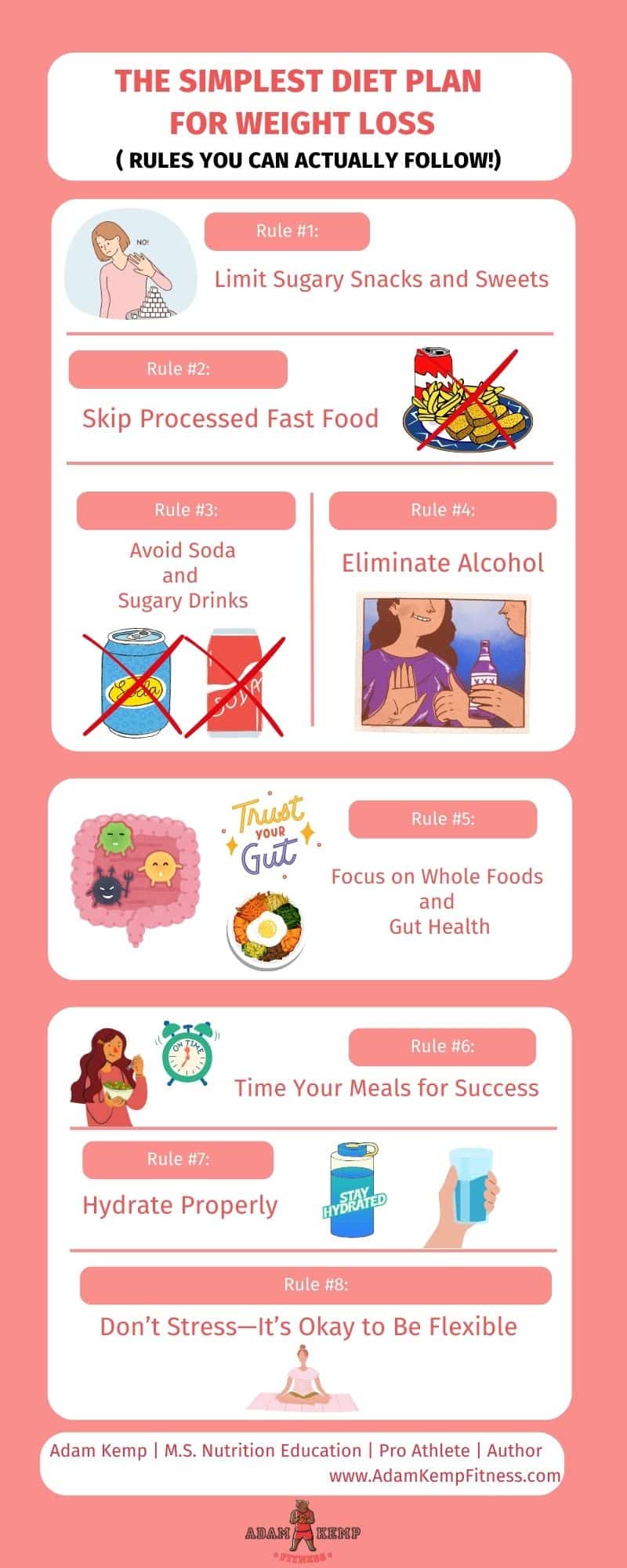
It’s easy to fall into unhealthy habits when it comes to food.
Eating on the go or reaching for junk food is convenient, but it can negatively impact our health in the long run.
The good news is that making small changes to our diet can greatly affect our overall health and well-being.
Here are some tips and tricks on how to fix your diet to become a healthy person.
Consume a Variety of Whole, Nutrient-Dense Foods
Rather than focusing on calorie counting, prioritize consuming whole, nutrient-dense foods rich in essential vitamins and minerals.
Include a variety of plant-based foods in your diet, such as fruits, vegetables, whole grains, and legumes. Green vegetables, in particular, are rich in folic acid and Vitamin B, which are important for brain function and energy.
Healthy fats, such as those found in avocado, olive oil, nuts, and seeds are essential for many cellular functions and are a preferred long-term energy source.
You want to stay away from most saturated fats and trans fats, but healthy unsaturated fats can actually protect you against various illnesses, including heart disease.
Fatty fish is also important because it contains high levels of readily absorbable Omega-3 fatty acids.
Omega-3 fatty acids can be found in cold-water fish like mackerel, salmon, and herring.
Protein is also an essential component of a healthy diet.
While animal products such as meat and eggs are great protein sources, it’s also important to include vegan protein sources such as legumes, nuts, and seeds.
Aim to consume a variety of different protein sources to ensure you’re getting all the amino acids your body needs.
One of the biggest challenges in maintaining a healthy diet is finding the time to plan and prepare healthy meals.
To make things easier, consider dedicating a day each week to meal planning and prep.
Plan out your meals for the week, and make a grocery list to ensure you have all the necessary ingredients.
Prepping meals and snacks in advance is one of the best kitchen hacks that can save time during the week and help you avoid reaching for unhealthy options when you’re short on time.
Focus on Prebiotic and Probiotic-rich Foods & Drinks
Incorporating whole foods that contain probiotics and prebiotics into your diet can have significant health benefits.
Probiotics are live bacteria and yeasts that are good for your health, particularly your digestive system.
Prebiotics, on the other hand, are a type of fiber that feeds the good bacteria in your gut, helping them to grow and thrive.
Here are some ways in which incorporating whole foods with probiotics and prebiotics can make you a healthy person:
- Boosts Digestive Health: Probiotics are known for improving digestive health by promoting the growth of beneficial bacteria in the gut. This can help to alleviate digestive issues such as bloating, gas, and constipation. Prebiotics act as food for these good bacteria, helping to support their growth and activity in the gut.
- Strengthens the Immune System: The gut is home to a significant portion of the body’s immune system. By improving the health of the gut microbiome through probiotics and prebiotics, you can strengthen your immune system and reduce the risk of infections and diseases.
- Improves Mental Health: Studies have shown a strong link between gut health and mental health. The gut-brain axis is a complex system that involves communication between the gut and the brain. Improving gut health with probiotics and prebiotics has been shown to improve symptoms of anxiety and depression.
- Weight Management: Some studies have suggested that probiotics and prebiotics may help with weight management by reducing inflammation and improving the body’s ability to regulate blood sugar levels.
Here are some additional examples of probiotic and prebiotic foods and drinks:
Probiotic Foods:
- Kombucha
- Fermented vegetables (e.g. pickles, carrots, beets)
- Kefir (dairy or non-dairy)
- Yogurt (dairy or non-dairy)
- Kvass
- Natto
- Raw cheese
- Apple cider vinegar (with the “mother”)
Prebiotic Foods:
- Chicory root
- Jerusalem artichokes
- Dandelion greens
- Jicama
- Garlic
- Onions (red, white, or yellow)
- Leeks
- Asparagus
- Bananas
- Apples (with skin)
- Oats
- Flaxseeds
Incorporating these foods into your diet can help to improve your overall health and well-being.
However, it’s important to note that everyone’s gut microbiome is unique, and what works for one person may not work for another.
If you have specific health concerns, it’s always a good idea to consult with a healthcare professional before making significant changes to your diet.
Consume a Nutrient-Dense Breakfast
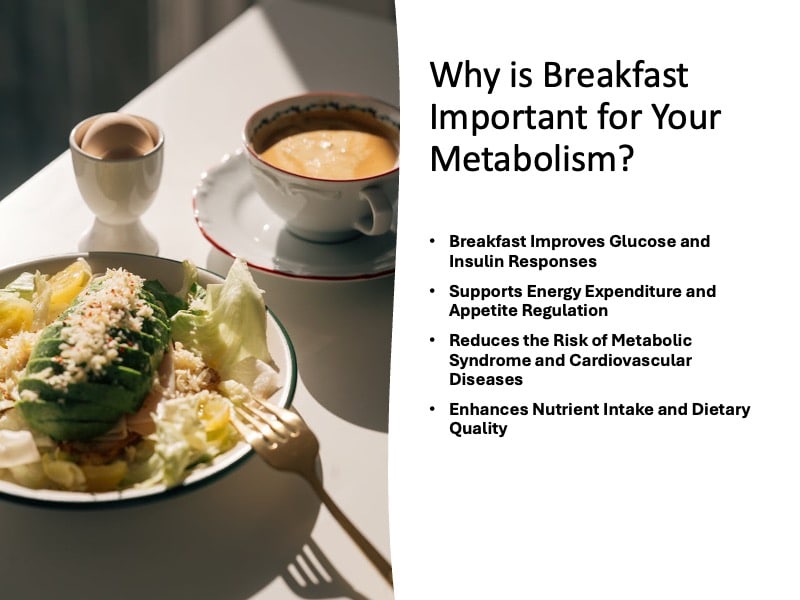
Breakfast is rightfully considered the most important meal of the day, and starting your day with a nutritious, metabolism-boosting breakfast is a great way to become a healthier person.
Skipping breakfast can cause you to feel sluggish, low on energy and make it difficult to concentrate.
It can also lead to overeating later in the day, as you may feel hungrier and less satiated from your meals.
However, not all breakfasts are created equal.
Eating a breakfast high in simple carbohydrates, such as sugary cereal or a muffin, causes a spike in your blood sugar levels.
This spike is followed by a crash, leaving you tired and hungry shortly after eating.
This cycle is known as the “blood sugar roller coaster” and can lead to weight gain and other health issues over time.
On the other hand, eating a metabolism-boosting breakfast that includes a balance of protein, healthy fats, and complex carbohydrates into your breakfast can help stabilize your blood sugar levels and prevent the roller coaster effect.
An easy step could be replacing your morning sugar-filled cereal with a good vegan gluten free granola, or replacing your morning sugar-filled coffee with Bulletproof Coffee.
Protein, in particular, can help you feel full and satisfied for longer periods, which may support weight management.
Some high-protein breakfast options include eggs, Greek yogurt, tofu scramble, and protein pancakes.
Personally, I love to start my morning with a nutrient-dense protein-packed smoothie.
Homemade whole-food smoothies are a great option because they save a lot of time in the morning.
If you don’t have a blender, I suggest investing in one because you can get an affordable one that will make a huge difference in your life.
You can spend time looking for a Ninja Vs Vitamix comparison that will explain the differences between the top-of-the-line blenders, or you can do what I did and buy an affordable Magic Bullet:
For those who don’t have time to make a nutritious breakfast or prefer to skip it altogether, intermittent fasting offers an alternative approach.
This eating pattern involves cycling between periods of eating and fasting, which can help with weight loss and other health benefits.
If you don’t have time in the morning for a nutritious breakfast, you can try intermittent fasting and have a planned “fast” during the breakfast window, and start your day with a larger, nutrient-dense lunch or brunch when you have the time.
Some popular methods include the 16/8 method, which involves fasting for 16 hours and eating within an 8-hour window, and the 5:2 method, which involves eating normally for 5 days and restricting calories to 500-600 for 2 days.
However, it’s important to consult with a healthcare professional before starting any new diet or eating pattern.
Incorporate Healthy Snacks
Snacking throughout the day can help keep your energy levels stable and prevent overeating during meals.
However, it’s important to choose healthy snack options that are nutrient-dense and filling.
Consider snacks such as fresh fruit, hummus, and veggies, or a protein-rich snack such as Hippeas Chickpea Puffs.
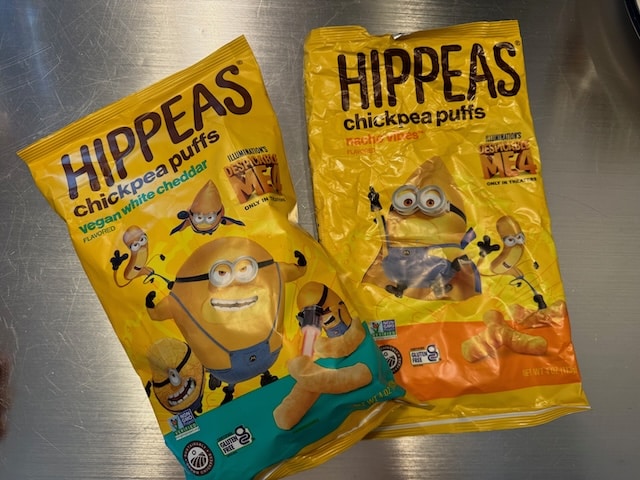
Another great snack option is air-popped popcorn, which is a low-calorie, high-fiber snack that can help keep you feeling full between meals.
Homemade trail mix, made with nuts, seeds, and dried fruit, is also a great option to keep on hand for a quick and nutritious snack.
These snacks are delicious and provide important vitamins and minerals to support your overall health.
It’s also important to pay attention to portion sizes when it comes to snacking.
Pre-portioned snacks, such as small bags of nuts or seeds, can be a great option to avoid mindlessly overeating.
However, it’s important to be mindful of the ingredients in packaged snacks and opt for options with whole food ingredients and minimal additives or preservatives.
Reading nutrition labels and ingredient lists can help you make informed choices.
Lastly, it’s important to note that snacking isn’t necessary for everyone.
Some people may feel better with three larger meals throughout the day and no snacks.
It’s important to listen to your body and find what works best for you.
Use a Few Evidence-Based Supplements
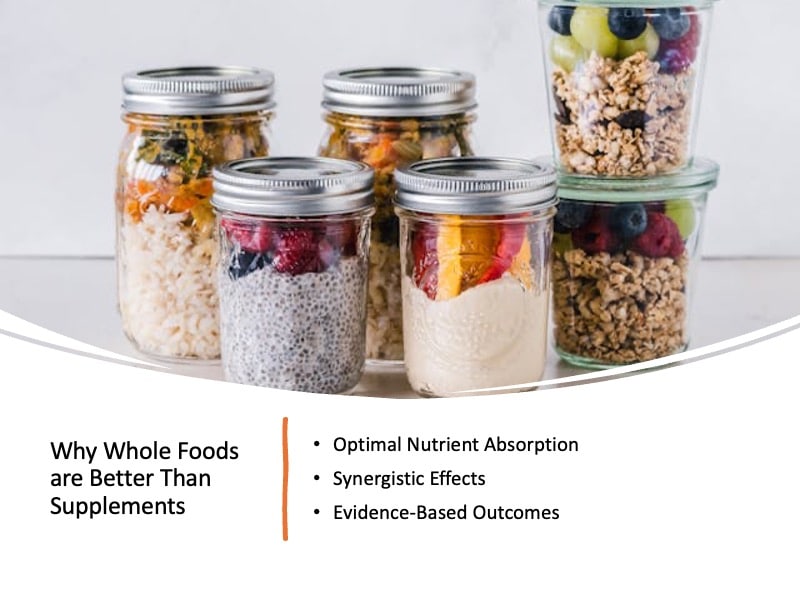
Incorporating supplements can be a helpful way to boost your overall health and well-being.
While whole foods should be the main source of nutrients in your diet, sometimes it can be challenging to get all the nutrients you need from food alone.
Supplements can help fill nutrient gaps and ensure you get all the essential vitamins and minerals your body needs to function optimally.
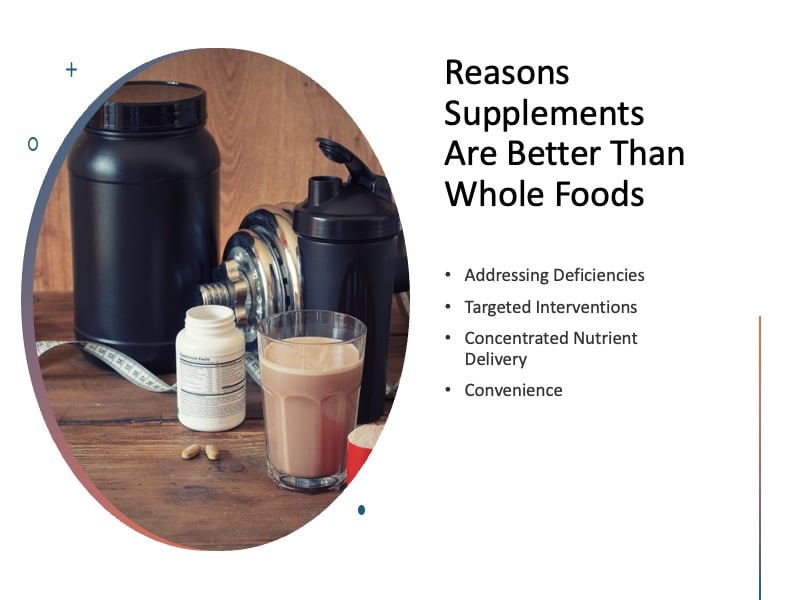
Quality protein supplements can help support muscle growth and repair, especially for individuals who struggle to meet their daily protein requirements through food alone. Protein powder supplements offer a convenient, nutrient-dense option that promotes overall health in a variety of ways.
Immune-boosting supplements such as vitamins C, D, and zinc can help protect your body against infections and illnesses.
Herbal supplements such as garlic, ginger, turmeric, and ginkgo biloba have been used for centuries to promote overall health and well-being, as these supplements can have antioxidant and anti-inflammatory properties, support digestive health, and boost brain function.
Greens powders, which often contain a variety of different green vegetable powders, can also provide a convenient way to consume a range of essential vitamins and minerals.
When selecting supplements, it’s crucial to do your research and choose high-quality options.
Many supplements on the market are of low quality and may not contain the advertised nutrients.
Be sure to look for supplements that have been tested by third-party organizations and are free of harmful additives.
If you want to become a healthier person, Bloom Greens & Superfoods is my favorite option.
Last update on 2025-07-11 / This article includes affiliate links/Images via Amazon Product Advertising API. I may earn commissions on purchases made through these links.
It’s also important to consult a healthcare professional or nutritionist before starting any new supplement regimen.
They can help you determine which supplements are right for your specific needs and ensure that you’re not taking any supplements that could interact with any medications you may be taking.
While supplements should never replace whole foods in your diet, incorporating high-quality supplements can be a helpful way to boost your overall health and well-being.
Drink More Coffee & Tea
Coffee and tea are two of the healthiest drinks, and consuming more coffee and tea is a simple way to become healthier.
Drinking tea is a great alternative to coffee for those sensitive to caffeine and has many potential health benefits.
People who are sensitive to caffeine get jittery when they drink coffee, so caffeinated tea is a great alternative in that aspect.
However, certain types of tea contain more caffeine than others.
For example, yerba mate tea contains significantly more caffeine than green tea.
Additionally, researchers have found that different types of tea may help with a variety of health issues, including diabetes, cancer, and heart disease.
For example, drinking mint tea or other types of tea regularly can reduce your risk of having a stroke or a heart attack.
Furthermore, studies show that the powerful antioxidants in tea, like EGCG, help prevent atherosclerosis and coronary artery diseases because of their anti-inflammatory effects on plaque deposits in the bloodstream and arterial walls.
The flavonoids in tea, like tea catechins, can help elevate metabolic rate, improve insulin activity, and increase fat oxidation.
If you are looking to lose weight, you can drink green tea or oolong tea for weight loss.
These are two of the best weight loss teas, and they possess a variety of other health benefits as well.
In addition, the catechins found in tea possess anti-inflammatory, anti-oxidation, anti-carcinogenic, and anti-bacterial properties.
Manhattan Gastroenterology reports that tea can inhibit pro-carcinogen formation, activate intracellular antioxidants, and suppress angiogenesis in the gastrointestinal tract, which helps to improve digestion.
One of my favorite tea companies is BlendBee, as they have delicious, organic, wild-crafted, made-to-order tea blends.
Drinking coffee is also healthy, and organic coffee is a good option for those looking for a healthier caffeine source.
Organic coffee retains more antioxidants and chlorogenic acid than non-organic coffee, which means it can provide more health benefits.
Plus, brewing your own organic coffee each morning can save you money, and purchasing fair-trade organic coffee can also help support sustainable farming practices and improve the lives of farmers.
One great option for organic coffee is Puroast Low Acid Coffee, which contains more antioxidants and less acid than other types of coffee.
By incorporating healthy drinks like tea and organic coffee into your daily routine, you can support your overall health and well-being.
Indulge Occasionally
To maintain a healthy lifestyle, occasionally indulging in some “fun” foods is important.
This doesn’t mean completely giving up on good nutrition but finding ways to enjoy healthy, tasty snacks and treats.
Natural and organic pies and sweets are great options for satisfying your sweet tooth without consuming unhealthy ingredients.
Additionally, mascarpone cheese is a popular Italian cheese made near Milan for centuries that can be used in a variety of dishes to add flavor and texture.
Traditional mascarpone cheese is made from nothing but whole cream and citric or tartaric acid, making it a great source of protein without any added chemicals.
Many other healthy indulgences are available too, and finding the right balance of enjoyable and nutritious foods is key to maintaining a healthy lifestyle.
Step 3: Get Active!
Being active is a crucial step in becoming a healthy person.
There are a variety of benefits of exercise for both physical and mental well-being, making it one of the best ways to care for your body and overall health.
Moreover, you do not need to be a professional athlete or already be in great shape to experience the physical and mental health benefits of exercise.
The key is to start, no matter what type of physical activity you choose.
Physical activity is crucial to becoming healthy because exercise releases natural endorphins in the brain that can reduce stress, alleviate anxiety and depression, boost self-esteem, and improve the immune system and sleep quality.
In addition, exercising can have a positive impact on hormone levels, including testosterone, growth hormone, cortisol, and insulin.
Here are some tips that can help you find enjoyable ways to incorporate physical activity into your life:
Start Slow
If you haven’t been very active lately, starting slowly and gradually increasing your activity level is important.
For people who haven’t exercised much in recent months or years, starting a rigorous exercise program too soon can create more problems than benefits.
You can begin by going for a walk once or twice a week or taking the stairs instead of the elevator.
You could also try doing some workouts at home a couple of times a week.
If you are concerned about spending money on a gym membership or exercising in public, there are many ways to get fit without going to a gym!
Once you establish a routine, gradually increase your activity level to three or four days weekly.
For example, you can ride your bike one day a week instead of walking or bike to and from work a couple of days a week.
If you prefer to exercise with others, joining a recreational sports league or taking tennis lessons can be more enjoyable than working out alone in a gym.
Whatever form of physical activity you choose, start with a little bit every day or every other day, based on what your body needs, and don’t worry about pushing yourself too hard.
You’ll quickly notice how much better you feel, and you’ll be motivated to do more!
Do Some Resistance Training
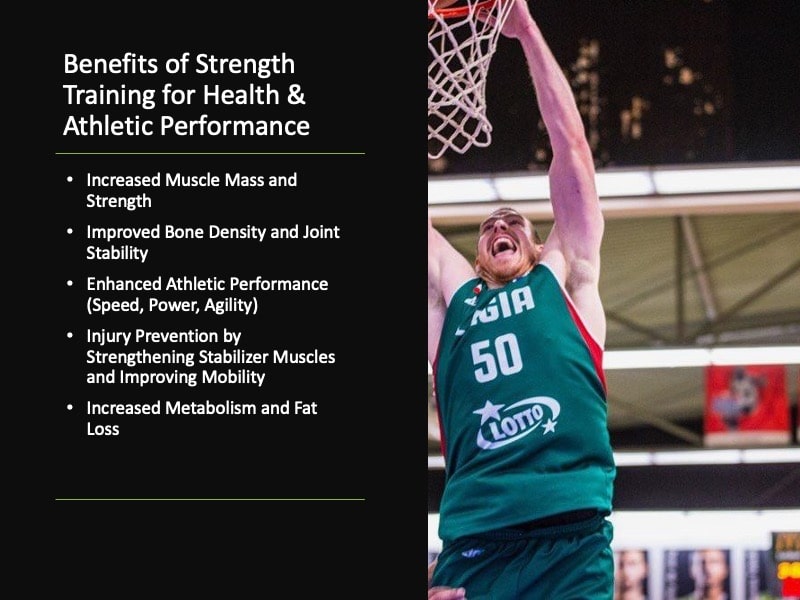
Resistance training, also known as strength training, is essential to becoming a healthy person because it provides numerous unique health benefits that other forms of exercise don’t.
Resistance training involves using resistance, such as weights, body weight, or resistance bands, to strengthen and tone muscles.
One of the most significant benefits of resistance training is that it increases muscle mass, which in turn boosts your metabolism and helps you burn more calories even when you’re at rest.
It also helps to prevent muscle loss that occurs with age, which is crucial for maintaining mobility and independence.
Another benefit of resistance training is that it helps strengthen bones, which is especially important for women who are at a higher risk for osteoporosis.
In addition, it can improve balance and coordination, reducing the risk of falls and injuries.
If you’re new to resistance training, starting slowly and focusing on proper form is important.
Bodyweight exercises, such as push-ups, squats, and lunges, are a great way to begin.
Resistance bands are also a good option for beginners, as they offer adjustable resistance and can be easily used at home.
Weight training is another popular form of resistance training, but it’s important to learn proper technique and use appropriate weights to avoid injury.
Many fitness centers offer classes or personal trainers that can teach you proper form and help you get started with strength training for beginners.
Even a small amount of resistance training each week can significantly impact your overall health and well-being.
Consider Hiring a Personal Trainer
If you want to take your fitness to the next level, consider hiring a personal trainer because these fitness training specialists can greatly impact the quality and safety of your daily workouts.
In fact, a study published in The Journal of Strength and Conditioning Research found that working with a personal trainer during resistance training can lead to greater initial 1RM strength values, self-selection of greater workout intensities, and greater ratings of perceived exertion values during exercise.
Even if you’re confident in your ability to train yourself, working with the right personal trainer for a month or two can provide the necessary shock your body needs to break through a plateau.
It’s no surprise that professional athletes work with personal trainers year-round, and the benefits can extend beyond just the physical.
In addition to designing workouts and training sessions, a fitness trainer can provide valuable knowledge on treating your body better.
Whether it’s diet tips and advice or guidance on how to incorporate light activity on off-days, working with a personal trainer can have a wealth of benefits.
Regardless of your fitness goals, a good personal trainer can make a positive impact on your body.
For those who can’t consistently afford to hire a personal trainer, online personal training is another great option that can provide many benefits.
Step 4: Take Care of Your Hygiene
Taking care of your hair, nails, skin, and teeth might seem like a small thing to do, but it can have a significant impact on your overall health and appearance.
In addition to the physical benefits, numerous psychosocial factors related to hygiene can influence your well-being.
Good hygiene habits can enhance self-confidence, social interactions, and overall quality of life.
It can make you feel good about yourself and give you a sense of control over your life.
On the other hand, poor hygiene can lead to social isolation, negative perceptions from others, and feelings of shame and embarrassment.
To improve your hygiene, it’s essential to start with the basics.
Choose mild and gentle cleansers for your hair, face, and body, and avoid harsh soaps and scrubs that can damage your skin.
Asap skin care line offers a range of gentle and effective products for different skin types that not only leaves you smelling fantastic but also cleanses your skin of dead cells and improves circulation.
Investing in the best trimmers or a quality razor that suits you is also essential.
A well-groomed appearance can make you feel more confident and help you present yourself better.
Dental hygiene is often overlooked but is crucial to your overall health.
Poor dental hygiene can lead to gum disease, which has been linked to an increased risk of cardiovascular disease.
Research from dental care clinics has shown that the blood of patients with cardiovascular disease has more bacteria than that of healthy people, highlighting the importance of good oral hygiene.
Your mouth is the gateway for food and bacteria, and even slight injuries in the mouth can leave you vulnerable to infections.
Regular brushing and flossing, along with annual or biannual dental check-ups, can help you keep your teeth healthy, maintain good oral hygiene and reduce the risk of developing infections or cardiovascular disease.
Learning to properly care for your hair, nails, skin, and teeth is one of the best things you can do for your overall health and well-being.
It’s a small investment of time and effort that can yield significant physical and mental benefits.
By taking care of yourself, you can feel confident, look great, and enjoy a better quality of life.
Step 5: Be Mindful
Practicing mindfulness is one of the best ways to become healthier because it can have numerous positive impacts on your physical and mental health.
Some people are skeptical of the benefits of meditation or believe that it’s too difficult to practice.
However, meditation is a skill that can be honed with dedication and practice over time.
Meditation has numerous benefits, including reducing stress, improving concentration, increasing self-awareness, and boosting happiness.
Meditation has been shown to have physical health benefits, such as improving cardiovascular and immune health.
By inducing relaxation, meditation allows blood vessels to open up and lower blood pressure.
If you’re new to meditation, taking an online meditation course can help you learn effective techniques for beginners to enhance your skills and improve your well-being.
Additionally, affirmations and positive self-talk can also improve physical and mental health.
Affirmations are positive statements made aloud or internally to oneself.
Step 6: Sleep More
Sleep is an essential part of maintaining good health and becoming a healthy person.
Adequate sleep can help improve many aspects of your life, including mood, cognitive function, physical performance, and overall well-being.
Unfortunately, many people today suffer from poor sleep habits, which can lead to a variety of negative health outcomes.
One of the most significant benefits of getting enough sleep is improved mood.
Studies have shown that sleep-deprived individuals are more likely to experience negative emotions, including irritability, anxiety, and depression, and getting enough sleep helps regulate mood and makes you feel happier and more positive throughout the day.
Sleep is also crucial for cognitive function.
When we sleep, our brains consolidate and process the information we’ve learned during the day.
This process is essential for memory retention, learning, and problem-solving.
If you don’t sleep enough, focusing and concentrating on tasks may be more challenging, impacting your productivity and performance.
Another benefit of getting enough sleep is improved physical performance.
When we sleep, our bodies repair and regenerate tissues, and our muscles and joints relax.
This process helps us feel refreshed and energized in the morning, which can improve our physical performance during the day.
Additionally, sleep deprivation can negatively impact athletic performance, making it harder to run faster, lift heavier weights, and perform other physical activities.
In addition to the benefits mentioned above, getting enough sleep is crucial for maintaining a healthy weight.
When we don’t get enough sleep, our bodies produce more ghrelin, a hormone that stimulates hunger.
Sleep deprivation can also lead to insulin resistance, making it harder to regulate blood sugar levels and maintain a healthy weight.
Overall, getting enough sleep is essential for maintaining good health and wellness.
If you’re struggling to get enough sleep, there are many things you can do to improve your sleep ha
bits, including developing a consistent sleep schedule, avoiding caffeine and alcohol before bed, and creating a relaxing sleep environment.
Additionally, natural supplements like melatonin, holy basil, valerian root, and 5-HTP can help you get a better night’s sleep without ordering prescription medication.
If you would like to try a natural sleep aid, Raw Botanics REST & Refresh is my favorite option.
If you’re still struggling to get enough sleep, consider seeking the help of a sleep specialist or trying an online sleep health program.
Step 7: Optimize Your Financial Health
Being financially healthy doesn’t require you to be rich, but it’s important to avoid debt as much as possible.
Personally, improving my financial health was one of the main reasons I decided to start a fitness blog.
Research shows that debt is correlated with poor health satisfaction, mental health, and obesity.
Improving your financial health can be complicated and is often impacted by circumstances.
For instance, a personal injury lawyer can help protect you against long-term negative financial consequences from a car accident.
If you have high amounts of debt, you can consider looking into consolidation loans, which can reduce interest payments and help you become financially healthy quicker.
A consolidation loan, such as those offered by Direct Tax Loan, can help you avoid defaulting on payments, which can cause serious stress and negative mental and physical health effects.
It’s important to make good choices to avoid negative long-term financial consequences like foreclosure.
Signing a mortgage agreement, student loan agreement, credit card agreement, or other debt-inducing agreement is a personal choice, so you want to do your best to avoid choices that will negatively impact your long-term financial health.
Speaking with a financial advisor, starting a savings account, and investing with apps like Robin Hood, Acorns, or Betterment can also help improve your financial health.
If you are making other steps to become a healthier person, Ibotta and Fetch are apps that offer cashback rewards for making purchases of certain items at participating stores.
By using these apps, you can save money on groceries and household items, which can help you manage your budget and improve your financial health.
Especially if you are trying to eat healthy and lose weight on a budget, cashback apps can make a big difference in helping you purchase healthier foods more frequently.
Additionally, both apps offer rewards for purchasing healthy items, such as fresh produce or organic products, which can encourage you to make healthier choices and improve your overall well-being.
By saving money and making healthier choices, you can work towards achieving both financial and physical health goals.
Final Thoughts: Can You Become a Physically and Mentally Healthier Person?
Becoming a healthy person can seem daunting, but it doesn’t have to be!
Instead of trying to change everything at once, start by making small, positive changes in your life.
Even seemingly insignificant habits can have a big impact on your overall health and well-being.
It’s important to remember that being healthy isn’t just about having a fit physique.
Mental health is also a crucial aspect of overall health, and it’s important to prioritize it just as much as physical health.
The prevalence of mental health issues has led to a rise in new counseling options like online therapy, which can be a convenient and accessible option for those seeking support.
Whether your goal is to develop an aesthetic body or simply improve your overall health, focusing on small changes can make a big difference.
Use the tips mentioned above to help you on your journey toward becoming a healthier person.
Remember, the most important thing is to keep moving forward and making progress, no matter how small.
With persistence and dedication, you can achieve your health goals and live a happier, healthier life.
This website does not provide medical advice. This website site does contain affiliate links, and purchases may earn a commission.
Read my Medical Disclaimer, Review Disclaimer, and Publishing Policies for more details. Use of this site indicates acceptance of these terms.

